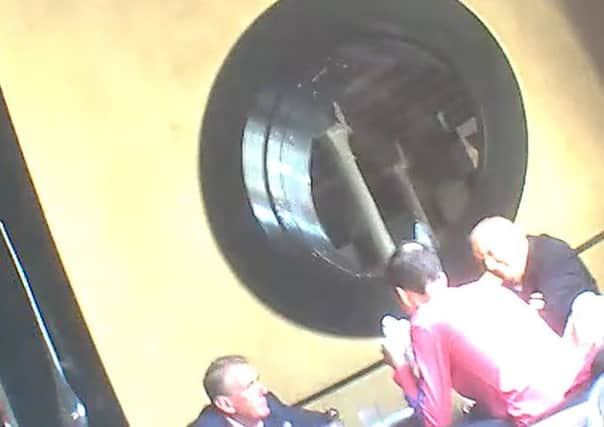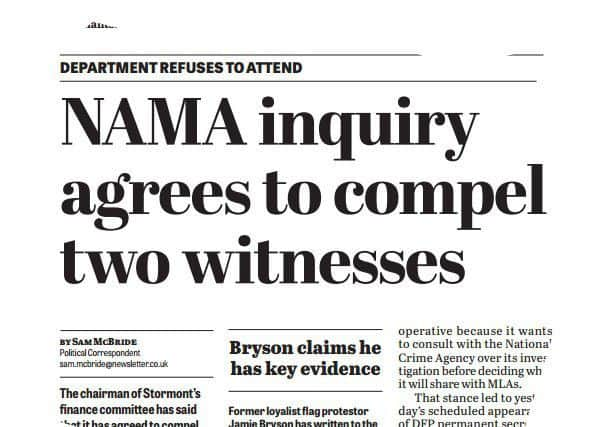MLAs back down over bid to compel Nama witnesses


The inquiry – arguably the most high profile in the history of the post-1998 Assembly – into Northern Ireland’s biggest ever property deal has heard both an accusation that the then First Minister Peter Robinson stood to get a huge sum as part of the deal and also his firm rejection of that claim.
Regardless of whether that headline-grabbing allegation could be proven or disproven, it was suspected from the outset that some of those with the most knowledge of the £1.3 billion deal would be reluctant to be publicly grilled about what had gone on.
Advertisement
Hide AdAdvertisement
Hide AdSection 44 of the Northern Ireland Act gives the Assembly (in reality, really its committees) the power to require any person “to attend its proceedings for the purpose of giving evidence” or “to produce documents in his custody or under his control”. That power is backed up by similar provisions in Strand One of the Belfast Agreement and in the Assembly’s Standing Orders.
Yet, more than 15 years after the creation of this Stormont Assembly, not a single committee has ever used its powers to compel witnesses.
However, the Finance Committee, led by its Sinn Fein chairman, Daithi McKay, was firm in its warning that it would become the first committee to use the powers.
Legal questions quickly emerged as to whether the committee could compel those who reside outside the jurisdiction and that meant that the committee dropped its threat to compel both Nama itself – which is based in Dublin – as well as US fund Cerberus, which bought the Nama Northern Ireland loans, and US law firm Brown Rudnick which helped broker the deal.
Advertisement
Hide AdAdvertisement
Hide AdBut that still left several key individuals – including top business figure Frank Cushnahan and lawyer Ian Coulter – who were central to the deal and who live in Northern Ireland. Now the News Letter understands that none of those individuals will be compelled to appear before the inquiry.


The chairman of the Assembly’s Finance Committee, Daithi McKay, was the most vocal and consistent proponent of the need to compel unwilling witnesses to the Nama inquiry if it was to get to the bottom of what had gone on.
Mr McKay repeatedly spoke out in favour of compelling witnesses, even as some of those potential witnesses began to argue against such a process.
In July, Mr McKay said: “We are prepared to compel NAMA to attend if they do not accept our invitation.”
Advertisement
Hide AdAdvertisement
Hide AdIn August, Mr McKay vowed that the committee’s inquiry would “leave no stone unturned” in its search for the truth into what had gone on.


At that point he also said the committee would “give full consideration to using our powers to compel the handing over of papers and to compel witnesses to appear before us if we feel it necessary”.
Two days later, Mr McKay said the committee had “agreed in principle to use the committee’s power to compel witnesses to come to the inquiry”.
John McCallister, a member of the committee, said that he disagreed with the decision. He told the News Letter: “If you are a witness, why would you come up [to Stormont] if you think these guys will never pursue me?”
Advertisement
Hide AdAdvertisement
Hide AdThe South Down MLA said that the decision set “a dangerous marker” for those who in future may wish “give two fingers” to any Stormont committee inquiry that they will not be compelled to attend, irrespective of what threats the committee makes at the time.
He said that the decision to never compel any unwilling witness “undermines the committee system and their ability to scrutinise issues” by “removing one of the most powerful tools that a committee has”.
Mr McKay was unavailable to discuss the issue as the committee’s report has not been finalised. Last week, after revelations by BBC Spotlight, the committee agreed to invite Peter Robinson’s lobbyist son Gareth, and others to give evidence – but there are just three weeks left to hear it before the Assembly is dissolved.
A spokeswoman for the committee said that it had “obtained legal advice on the scope for exercising its statutory powers to require witnesses to attend its proceedings for the purpose of giving evidence”.